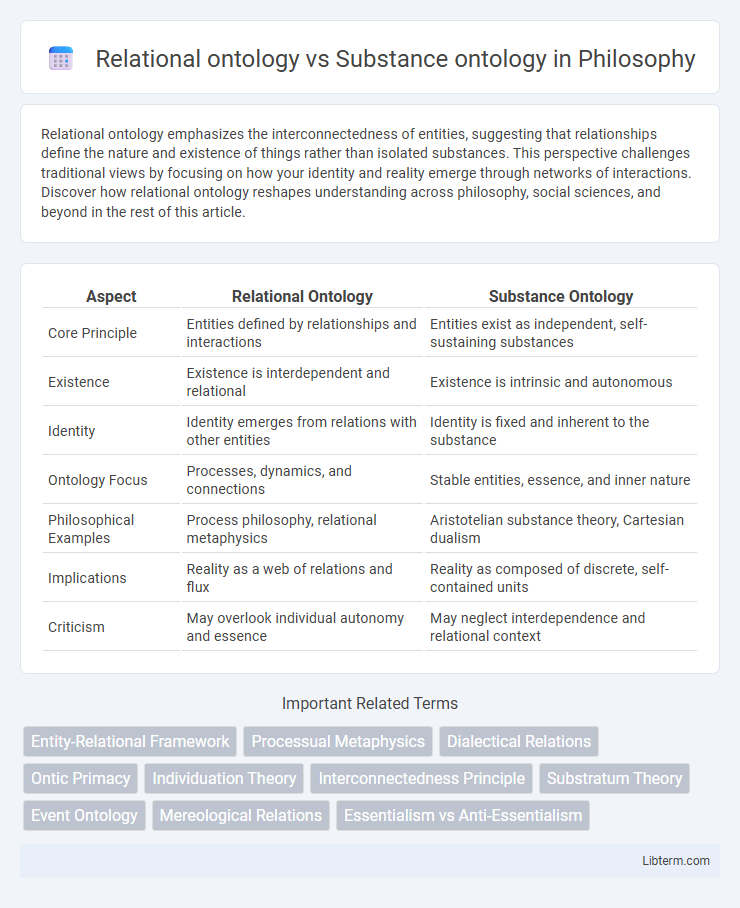Relational ontology emphasizes the interconnectedness of entities, suggesting that relationships define the nature and existence of things rather than isolated substances. This perspective challenges traditional views by focusing on how your identity and reality emerge through networks of interactions. Discover how relational ontology reshapes understanding across philosophy, social sciences, and beyond in the rest of this article.
Table of Comparison
| Aspect | Relational Ontology | Substance Ontology |
|---|---|---|
| Core Principle | Entities defined by relationships and interactions | Entities exist as independent, self-sustaining substances |
| Existence | Existence is interdependent and relational | Existence is intrinsic and autonomous |
| Identity | Identity emerges from relations with other entities | Identity is fixed and inherent to the substance |
| Ontology Focus | Processes, dynamics, and connections | Stable entities, essence, and inner nature |
| Philosophical Examples | Process philosophy, relational metaphysics | Aristotelian substance theory, Cartesian dualism |
| Implications | Reality as a web of relations and flux | Reality as composed of discrete, self-contained units |
| Criticism | May overlook individual autonomy and essence | May neglect interdependence and relational context |
Introduction to Ontology: Defining Key Concepts
Relational ontology emphasizes the interconnectedness and dynamic relationships between entities, viewing existence as dependent on these interactions rather than isolated substances. Substance ontology, by contrast, focuses on the independent, self-contained nature of entities as fundamental units of reality with intrinsic properties. Understanding these key concepts provides a foundational framework for exploring how different ontological perspectives define the nature of being and existence.
Understanding Substance Ontology
Substance ontology centers on the concept that entities possess an inherent, independent essence that defines their existence and properties. This view contrasts with relational ontology, which emphasizes the interdependence and relations between entities as constitutive of their being. Understanding substance ontology involves recognizing entities as self-sufficient substances with intrinsic characteristics, unaffected by external relations.
Exploring Relational Ontology
Relational ontology emphasizes the primacy of relationships and connections between entities rather than viewing objects as isolated substances with inherent properties. This perspective suggests that the essence of being arises through interactions, making existence fundamentally contingent on social, environmental, or metaphysical relations. Exploring relational ontology reveals its application across disciplines such as anthropology, ecology, and physics, where understanding interconnectedness challenges traditional substance-based metaphysical frameworks.
Historical Context: From Substance to Relation
Relational ontology emerged as a critical response to the classical substance ontology that dominated Western philosophy since Aristotle, who emphasized entities as independent substances with fixed essences. This shift gained momentum during the 20th century through the works of philosophers like Alfred North Whitehead and Martin Heidegger, who argued that existence is primarily defined by relationships rather than isolated substances. The historical transition from substance to relational ontology reflects a growing recognition of interdependence and process over fixed, discrete entities in metaphysical and scientific discourse.
Core Principles of Substance Ontology
Substance ontology centers on the idea that the world consists of independent, self-sustaining entities or substances that possess inherent properties defining their identities. These entities exist objectively and maintain continuity through change, with their properties being intrinsic rather than relational or dependent on external factors. This core principle contrasts with relational ontology, which emphasizes the primacy of relationships over standalone entities.
Fundamental Tenets of Relational Ontology
Relational ontology emphasizes that entities are defined by their relationships and interactions rather than by inherent, independent substance, contrasting with substance ontology which views entities as self-contained and primary. It asserts that existence and identity emerge from interconnections, prioritizing relational structures over isolated essences. This perspective is foundational in fields such as social sciences, quantum physics, and process philosophy, where dynamic relations constitute reality.
Key Philosophers and Their Perspectives
Relational ontology, emphasized by philosophers such as Martin Heidegger and Alfred North Whitehead, asserts that entities are defined by their relationships and interconnections rather than by isolated substances. Substance ontology, rooted in the works of Aristotle and Rene Descartes, posits that reality consists of discrete, independent substances with intrinsic properties. Contemporary debates often contrast Whitehead's process philosophy, which foregrounds dynamic relations, against Cartesian dualism's emphasis on fixed, self-contained substances.
Comparative Analysis: Strengths and Weaknesses
Relational ontology emphasizes the interconnectedness and dynamic relations as the fundamental aspects of existence, offering strengths in explaining social phenomena and processes but often criticized for lacking clear identity criteria for entities. Substance ontology posits discrete, independent substances as primary, providing a stable framework for understanding individuality and persistence but struggles to account for relational and contextual dependencies. Comparative analysis reveals relational ontology excels in capturing fluid interactions and systemic complexity, while substance ontology offers clarity and coherence in defining objects, highlighting a trade-off between flexibility and definitional precision.
Applications in Contemporary Thought
Relational ontology emphasizes the interdependence and interconnectedness of entities, shaping contemporary social sciences by promoting network theories and systems thinking in sociology, anthropology, and ecology. Substance ontology, focusing on discrete and independent entities, remains influential in physics and classical metaphysics, supporting foundational ideas in identity and object permanence. This distinction guides debates in areas such as artificial intelligence, ethics, and environmental philosophy, where understanding the nature of being affects theoretical frameworks and practical applications.
Future Directions in Ontological Debates
Future directions in ontological debates emphasize integrating relational ontology's dynamic interconnectedness with substance ontology's emphasis on entity persistence, fostering hybrid frameworks that address both relational processes and enduring substances. Emerging research explores how quantum physics and process philosophy can refine relational views, challenging classical substance assumptions and encouraging ontologies that reflect complexity and change over time. Interdisciplinary approaches combining metaphysics, cognitive science, and information theory aim to generate more comprehensive models that capture the fluidity of existence without discarding the stability provided by substance ontology.
Relational ontology Infographic

 libterm.com
libterm.com